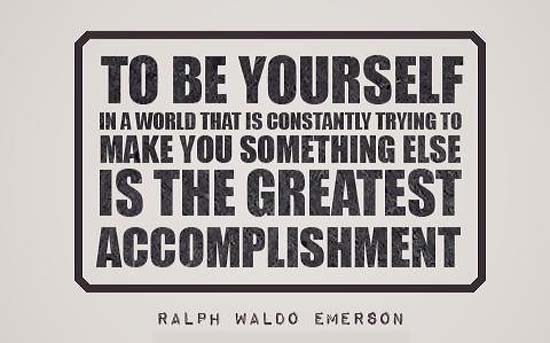Life
12 Reasons To Stop Photoshopping Your Life

“Just be yourself”. We’ve all heard the golden rule a thousand times before, yet how many of us can honestly say we openly expose the complete, unedited version our authentic self for the world to see – blemishes and all?
Whether we’re talking a subtle retouching of our perceived imperfections, or a gaping chasm between the mask we wear in public and the true self hidden within, almost everyone is holding onto some heavily conditioned beliefs around what we must present to the world in order to fit in, be accepted, liked and loved. But the extent to which this airbrushing of inauthenticity can be negatively impacting our lives and may go deeper than you think.
Reasons To Be More Authentic
1. A recipe for regret
Living in alignment with someone else’s ideals rather than your own will generally set you on an unfulfilling journey toward disappointment, regardless of what you achieve. No matter how much you tick off the socially prescribed wish list or how many peoples’ expectations you manage to please, the pain of regret for not taking the wheel of your life and driving it along the road of your true purpose is rarely subtle enough to escape.
2. Holding back the tide
If you’re holding back the authentic you from shining, you’re stemming the flow of your true personal power and depriving the world of all you’re capable of bringing into it. You are the best there is at being you – so why not do it with pride? When we decide to try and live by or compare to someone else’s path, we resign ourselves to playing smaller than where our unique magnificence can take us.
As Judy Garland put it:
“Always be a first-rate version of yourself, instead of a second-rate version of somebody else”.
3. Eroding self-worth
Any belief that the real version of you needs to be edited and polished before being fit to put on display implies to your true self that it’s somehow not good enough, lacking or that there’s clearly something wrong with you.
Regardless of what you may be portraying on the surface, living incongruently with your authentic self is a hotbed for cultivating a damaging low sense of worth that the world cannot help but reflect right back at you.
4. Forever vanilla
People are magnetised to a leader who stands out from the crowd and freely allows their unique flavour of magnificence to shine – the few who really live and own their authentic truth, irrespective of what anyone else might think. Those who go seeking acceptance, admiration and respect by striving to fit into the model of what they think everyone wants are destined to blur into the faceless vanilla herd.
5. The inhuman touch
Allowing your true self to be vulnerable is the key to opening up the greatest level of connection with others. In a mask-wearing world people delight in the liberation of being able to let down their guard and truly be themselves, and in sharing our so-called “imperfections” we give others permission to do the same. Think of those you are drawn to open up around and how that makes you feel, versus the depth of relationship you are able to experience with someone presenting a seemingly perfect disguise.
“The only normal people are the ones you don’t know very well” – Joe Ancis
6. Living in fear
When the persona you present to the world is anything other than completely authentic, you live with the constant threat of being “found out” and carry around a restrictive burden of unease that any parts not congruent with this ideal must remain firmly locked away. When you fully own your truth and openly wear your heart on your sleeve there is nothing to hide and nothing more to fear – your complete vulnerability creates an empowering invincibility.
7. Shields up
In order to maintain a strong façade and protect our full self being exposed, we tend to develop some pretty effective defences. Sadly, these generally have the opposite effect to inviting the belonging and connection we’re really seeking as they’re mostly designed to keep others at a comfortable distance from ever engaging too deeply or entering into your life beyond the boundaries that you patrol.
8. Who do you think you’re fooling?
People can sense far deeper than the surface level of interaction that you’re able to paint. They know it. You know it. And the flimsier the authenticity of this polished exterior, the more powerful unconscious conversation is going on at the unseen “gut feeling” level.
As Ralph Waldo Emerson said:
“Who you are shouts so loudly in my ears that I can’t hear what you’re saying”.
9. Conditional love
The more you openly give of your true self in a relationship determines the depth of love and fulfilment you can experience in that connection. Yet some people still find themselves filtering the thoughts, feelings and behaviours they are comfortable to share with even their closest companion. To experience the divinity of unconditional love there must be a willingness to expose the rawest version of your soul, or you’ll never feel truly accepted for anything but the polished façade you present.
10. Stunted growth
The most impactful relationship in your life is the one you have with yourself – but how willing are we to look deeply into our own truth, honestly accept our imperfections and know ourselves for who we really are? Only when we step aside from the distortions of our ego and clearly see where the gaps are can we invite the real change, growth and progress that will actually fill them, rather than simply painting over the cracks with a fresh coat of denial.
11. Wasting energy
Let’s face it, ensuring you’re on the ball to keep up appearances all the time can involve a lot of effort, energy and exhausting tension that could be much better spent elsewhere. How many more miles to the gallon could you achieve with the life energy that effortlessly flows through you when you cast off the shackles, step into your true essence and dance like nobody’s watching?
12. Short-changing yourself
In the end, donning the protective gear that keeps our authentic self at a safe distance from exposure to the possible bumps and bruises along the journey of life also prevents us from ever wholeheartedly embracing the highest highs. Diluting how much of ourselves we are willing to unreservedly throw into anything we do only waters down any reward we can ever genuinely receive. Real fulfilment comes with living freely, living fully and living your truth.
“The privilege of a lifetime is to become who you truly are.” – C.G. Jung
Life
Imposter Syndrome Is Rooted in Your Past But Here’s How You Can Rewire It
Imposter syndrome is most prevalent in highly successful women

Imposter syndrome is “the persistent inability to believe that one’s success is deserved or has been legitimately achieved as a result of one’s own efforts or skills.” (more…)
Life
The Surprising Mental Health Tool You Probably Haven’t Tried
Through journaling, I arrived at a more balanced perspective, it reinstated my sense of gratitude and led me to accept my disability

In two particularly difficult times in my adult life, my journaling practice is helping me heal emotionally. It has been a vital tool for helping me see the bigger picture and land in a place of gratitude. (more…)
Life
How to Stop Comparing Yourself to Others and Find True Happiness
Comparison is the thief of joy; it robs us of our happiness, self-esteem, and peace of mind

In today’s hyperconnected world, it’s easier than ever to fall into the trap of comparing ourselves to others. Social media platforms like Instagram, Facebook, and LinkedIn constantly bombard us with curated highlights of other people’s lives, making it seem like everyone else is happier, more successful, and more fulfilled than we are. (more…)
Life
Harness the ‘Battery Effect’ to Transform Life’s Tensions into Your Greatest Strength
Recharge your life batteries by shifting your mindset today

I believe our life capacity is determined by the skillsets we develop on this spinning rock we call Earth. By “life capacity,” I mean our ability to embrace and sustain joy. (more…)
-

 Success Advice3 weeks ago
Success Advice3 weeks agoThe One Mindset Shift That Made Me Irreplaceable At Work
-

 Scale Your Business4 weeks ago
Scale Your Business4 weeks agoWhy Smart Entrepreneurs Never Skip This One Business Expense
-

 Success Advice3 weeks ago
Success Advice3 weeks agoHow Playing by the Rules Became the Smartest Business Strategy
-

 Did You Know3 weeks ago
Did You Know3 weeks ago7 Surprising Life Lessons Video Games Taught Me That School Never Did
-

 Success Advice2 weeks ago
Success Advice2 weeks agoHow to Build Trust, Kill Micromanagement, and Lead a Team That Thrives
-

 Scale Your Business2 weeks ago
Scale Your Business2 weeks agoHow to Build a Workplace People Actually Want to Show Up To
-

 Success Advice2 weeks ago
Success Advice2 weeks agoSuccess Isn’t Sexy: 5 Daily Habits That Actually Work
-

 Scale Your Business2 weeks ago
Scale Your Business2 weeks agoHow Smart Entrepreneurs Cut Financial Chaos in Half with One Simple Switch































1 Comment